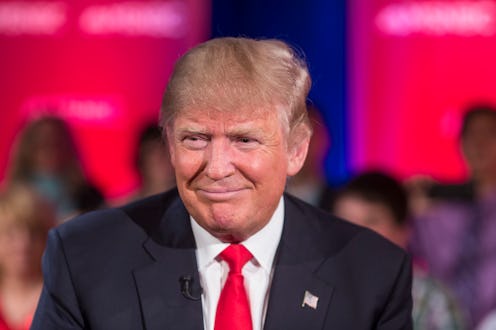News
Trump Could Run A Write-In Campaign, But...
The GOP primary really looks like it’s going to come down to the wire. The betting markets now give better-than-even odds that Republicans will have a contested convention this year, and that means almost anything is possible. One potential outcome is that Donald Trump loses the nomination and runs a third-party campaign instead. Ted Cruz dismissed that idea on Thursday, but he shouldn’t: A third-party campaign by Donald Trump is completely within the realm of possibility — and it would almost certainly doom Republicans’ chances of winning the presidency in 2016.
Cruz told Wisconsin radio host Charlie Sykes that Trump “doesn’t have the option of running as a third party” because he wouldn’t be able to get his name on the ballot in enough states. Which is entirely possible. Ballot access requires quite a bit of organization and groundwork, and if Trump loses at the convention in July, he’ll have precious little time to file the paperwork and collect the signatures needed to get a spot on the ballot come November.
But that’s not the only way to run a third-party campaign. Trump could also run a write-in campaign for president. That would require substantially less effort on his part; he’d basically just have to tell his supporters to write his name into the blank spot that ballots have for exactly this reason.
Now, such a campaign would almost certainly not result in President Trump taking the oath of office in 2017. Most states allow write-in candidates, but there are a few that don’t. Despite Alaska Sen. Lisa Murkowski’s high-profile win during her 2010 reelection bid, write-in candidates almost always lose their elections, and moreover, America has never once elected a write-in candidate to the White House.
But these details miss the point, because if Trump runs a third-party campaign, his goal won’t be to win the White House. His goal will be to exact revenge on the party that, in this hypothetical scenario, denied him the nomination even though he received the majority of delegates in the primary.
Trump, as many observers have noted, is a guy who likes to get revenge on those who have wronged him (at least in his POV). That’s why, when he pledged to support the eventual Republican nominee no matter who they were, he cautioned that he’d only uphold his part of the bargain if the GOP treated him “fairly.” On the same note, that’s why he broke that pledge earlier this week — because he felt he’d “been treated very unfairly” by the Republican Party. (The fact that he never defines what "fair" means is intentional.)
If Trump does end up running a third-party campaign, then that’s the game, folks. He commands the support of roughly 40 percent of Republican voters, and there’s good evidence that his supporters are extremely, extremely loyal. Most of them would not abandon him if he was still soliciting their vote. In a three-way battle between a Democrat, a Republican, and Trump, Trump would split the Republican vote right down the middle and, in doing so, ensure that the Democratic nominee won the presidency.
We’re a long way out from knowing whether Trump will run a third-party campaign, but he certainly has that option. That option won't, however, get Trump into the White House.
